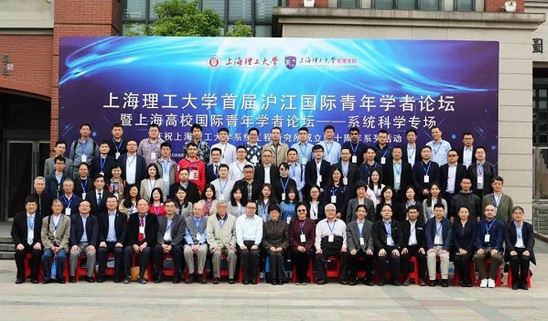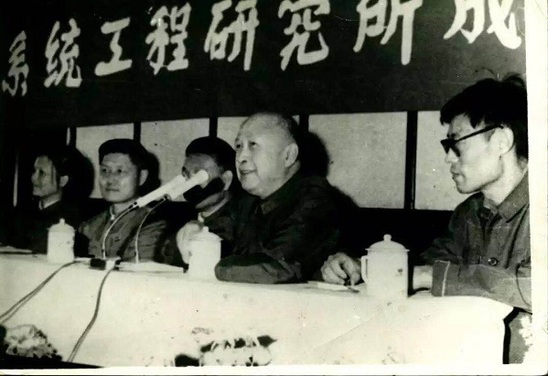Decades ago, the development of Bell’s communication technology, the success of Apollo’s moon landing, and even the world’s first nuclear explosion experiment were inseparable from the support of system science. This discipline that explores the universal laws of various systems and searches for the “optimal” plan has a special history of development in China. Now, with the “meeting” of artificial intelligence and big data, this discipline seems to usher in development opportunities again.
Not long ago, the first Hujiang International Young Scholars Forum was held at the University of Shanghai for Science and Technology. A group of young scholars in the field of systems engineering gathered. One of the reasons for attracting everyone is that there is system science as a Shanghai peak discipline construction. This discipline ranked third in the country in the fourth round of discipline evaluation by the Ministry of Education last year. Research on complex networks, system analysis and optimization, and complex system theory Direction is also the key to current artificial intelligence applications. In recent years, the employment rate of graduates from related majors has reached 100%, becoming a “sweet cake”.
Complex world, looking for the best solution
This year is also the 40th anniversary of the establishment of Shanghai Science and Technology System Science, and the academic leader Professor Gao Yan has witnessed the development. He introduced that in 1979, the school became the earliest system science and systems engineering teaching and research institution in China. When the Institute of Systems Engineering was established, Qian Xuesen also attended the conference and gave a speech. At that time, when the first freshman majoring in systems engineering enrolled, the school became one of the first universities in the country to enroll undergraduates of systems engineering. Subsequently, systems engineering opened a research class (teacher class), the first school to introduce a complete set of intelligence in China. The teachers are from Massachusetts Institute of Technology, Indiana University, Georgia Institute of Technology and other schools, and they teach directly in English (externally known as MBA class) . At that time, a delegation from the Massachusetts Institute of Technology Sloan School of Management visited the school and signed a cooperation agreement.
“Systems science and engineering are disciplines with Chinese characteristics. They are regarded as a kind of “Chinese school” in the world. Qian Lao once said, “The combination of man and machine is based on man.” He especially emphasized the role of'human. “It is the difference between China’s system science that was developed at that time and foreign countries.” Gao Yan said that he and his research team are aiming at the smart grid to conduct a system science study, hoping to use the massive data of the power system as support, from the needs of “people” Side study how the power system becomes smarter. “Data can record the electricity consumption habits of a family, guide electricity consumption behavior through better suggestions and a smarter real-time electricity price system, and connect with smart home electricity solutions. It can not only save expenditure, but also save energy and reduce emissions, and increase electricity consumption. effectiveness.”
However, with the development of society, more and more super-complex problems have emerged, and management science may not be able to solve them at all, and systems science is needed. “But at that time we had theories and methods, but did not have strong computing capabilities. Therefore, this discipline was also split into fields such as management and engineering, and gradually declined. Now, with the development of big data and artificial intelligence, There will be new opportunities for leapfrog development in the development of disciplines and employment of systems science.” Gao Yan said.
Qian Xuesen and Shanghai Science and Technology System Science
Che Hongan is the “founder” of Shanghai Science and Technology System Science. According to his recollection, the process of discipline creation has been cared by Qian Xuesen many times. In October 1979, the first national system engineering symposium was held in Beijing Jingxi Hotel for a week. Qian Lao specifically mentioned the whole country in the conference report of “Develop systems engineering vigorously and build systems and scientific systems as soon as possible”. More than a dozen colleges and universities have set up courses in systems engineering, including Shanghai Institute of Mechanical Engineering (the predecessor of Shanghai Polytechnic). In November 1979, Qian Lao went to Shanghai on a business trip. He called Che Hongan in the morning to care about the construction situation. He also personally participated in the inaugural meeting of the Institute of Systems Engineering of Shanghai Institute of Mechanical Engineering. Qian Lao also came to the school to give a special report. At that time, the teacher who was engaged in thermal engineering and instrumentation at the school handed over a note and asked “How do people who engage in automatic control engage in system engineering”. Qian Lao replied, “Automatic control does not mean engaging in system engineering. We have to consider the human factor. Our housekeeping skills for automatic control are one to build mathematical models and the other is simulation. As far as I know, the models built by our automatic control have not been able to incorporate human factors.” Years have passed, and Che Hongan has increasingly realized that the special point of the system engineering discipline is to consider the human factor, “this is the core of Qian Xuesen’s system science thinking.”
In 1980, Che Hongan sent the school’s teaching plans and textbooks introduced by MIT to Lao Qian. He was very happy after reading it. He said, “Considering your teaching situation, regardless of graduate students, undergraduates, especially undergraduates, you must learn two things well: One is English, and the other is computer. For such an advanced major, if you don’t master these two, you will definitely not be able to do it. Because this is the international frontier, without these two wings, you can’t fly high.” The school still mentioned in the report. When it comes to the establishment of a discipline system and how to solve basic theories, Qian Lao attaches great importance to this problem. He put forward three suggestions on “what kind of people should be found to study the basic theories of systems science”: they must have a relatively good science foundation and have applications. Interest requires a philosophical mind.
Qian Lao also said: “Today’s science is no longer something like natural science, but the entire knowledge system for mankind to understand the objective world and transform the world. I hope everyone can use such a system to observe, analyze, research, and solve problems. It’s not just the knowledge of a few disciplines, or the intersection of these disciplines. If this is possible, it will be great.”
Today, I look at the words that Mr. Qian once said. They are not out of date.



https://wap.xinmin.cn/content/31523020.html?from=singlemessage&isappinstalled=0


